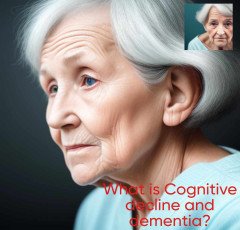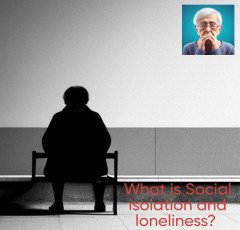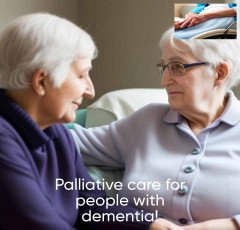
What is Cognitive decline and dementia ?

A steady deterioration in cognitive skills like thinking, memory, and reasoning is referred to as cognitive decline.
Although it is a normal aspect of aging, it can also be brought on by a number of conditions, including neurological abnormalities, chronic illnesses, and drug adverse effects.
A syndrome called dementia is characterized by a sharp deterioration in cognitive functioning that makes it difficult to carry out daily tasks.
It is a general word that covers a variety of cognitive problems that have an impact on thinking, behavior, and memory. Alzheimer's disease is the most prevalent kind of dementia, although there are many other forms include vascular dementia, Lewy body dementia, and frontotemporal dementia.
Memory loss, disorientation, language problems, and changes in mood and behavior are some of the symptoms of dementia.
It can significantly influence a person's capacity for independent functioning, as well as their standard of living. Although dementia cannot be cured, early detection and treatment can help manage symptoms and enhance general quality of life.
Age, heredity, lifestyle habits including drinking, smoking, not exercising, and eating poorly, as well as underlying health disorders like diabetes and cardiovascular disease, are some of the risk factors for cognitive decline and dementia.
Depending on the type of dementia and the disease's stage, the symptoms of cognitive decline and dementia can change.
A person may have little amnesia, trouble finding words, or trouble following a discussion in the early stages. As the condition worsens, symptoms such as difficulties performing routine chores, disorientation, personality changes, and behavioral issues may appear.
There are many methods for treating cognitive decline and dementia, including dietary changes, frequent exercise, and maintaining social contact. In addition to treating symptoms, medications can also be used to treat underlying diseases.
Early detection and treatment of cognitive decline and dementia are crucial for managing symptoms and making future plans.
This can entail a thorough assessment by a medical practitioner, which might include a neurological checkup, mental tests, and imaging investigations. The finest care and support for people with dementia and cognitive decline can be given through a team-based approach that involves caregivers, family members, and medical experts.
In addition to the person who has the condition, carers and family members may also experience substantial effects from cognitive decline and dementia. Physical, mental, and financial hardship, as well as disturbances to their own personal and professional lives, can all affect caregivers.
There are tools and support services available to help family members and caregivers deal with the difficulties of caring for a person who is experiencing cognitive decline or dementia. These might include counseling services, support groups, and respite care.
There is optimism that new interventions and therapies will be produced in the future as a result of continuous research into the causes and treatment of cognitive decline and dementia. People should be aware of the risk factors in the interim and take precautions to safeguard their cognitive health all throughout their life. This could entail controlling underlying medical concerns, engaging in mentally stimulating activities, and leading a healthy lifestyle.
There is also continuing study into the variables that may contribute to cognitive decline and dementia, such as chemicals in the environment, traumatic brain damage, and long-term stress. People should be aware of these possible risk factors and take precautions to reduce their exposure.
There are a number of methods that can help people with dementia and cognitive impairment keep their independence and level of quality of life. These may include symptom management techniques such as cognitive and behavioral therapy, home changes to increase safety and accessibility, and assistive technologies like memory aides.
Dementia and cognitive decline are complicated disorders that can have a big impact on people and their families.
Although there is no known treatment for many illnesses, early detection, treatment, lifestyle changes, and support services can help manage symptoms and enhance general quality of life. There is promise for the future development of new interventions and therapies thanks to ongoing research into the causes and remedies for dementia and cognitive decline.
The importance of prevention in lowering the risk of cognitive decline and dementia should not be understated.
Several lifestyle factors can be changed to lower the risk of cognitive decline and dementia, although certain risk factors, like age and heredity, cannot be changed. These consist of:
Regular physical activity has been found to enhance cognitive function and lower the risk of dementia and cognitive decline.
Healthy eating:
A diet high in fruits, vegetables, whole grains, and lean proteins can help lower the risk of cognitive decline and dementia. It should also be low in saturated fats.
Reading, solving puzzles, playing games, and other cognitively stimulating activities can sustain cognitive function and lower the risk of cognitive decline.
Social interaction:
Keeping up with friends and family can assist maintain cognitive function and lower the incidence of dementia and cognitive decline.
Managing underlying health conditions:
Managing underlying medical disorders can help lower the risk of cognitive deterioration and dementia. These illnesses include high blood pressure, diabetes, and depression.
People can lower their risk of dementia and cognitive decline, as well as improve their general health and well-being, by implementing certain lifestyle changes.
To draw attention to the significance of educating communities, lowering stigma, and raising awareness of dementia and cognitive decline.
Through greater knowledge and care for their needs, this helps lessen the social isolation that people with dementia and cognitive decline often suffer.
An efficient strategy to raise knowledge and comprehension of cognitive decline and dementia is through community-based programs that offer education, social support, and resources. To design and implement programs and policies that help people with cognitive decline and dementia and their families, healthcare professionals, researchers, policymakers, and community leaders can work together.
Dementia and cognitive decline are complicated disorders that can have a big impact on people and their families. Although there is no known treatment for many illnesses, early detection, medication, and lifestyle changes can help control symptoms and enhance quality of life. To lessen the impact of cognitive decline and dementia on people, families, and communities, ongoing research, preventive, and awareness activities are crucial.















 The Secret Email System
The Secret Email System  Unreal Engine 5 For Beginners Learn The Basics Of Virtual Production
Unreal Engine 5 For Beginners Learn The Basics Of Virtual Production  Online Marketing
Online Marketing  Acer Laptop
Acer Laptop  Smart Doorbell
Smart Doorbell  Best Selling Books
Best Selling Books  Amazon Best Selling Products
Amazon Best Selling Products  Only For The United States
Only For The United States  Online Technology Classes
Online Technology Classes  ELECTRONIC ACCESSORIES
ELECTRONIC ACCESSORIES  Unlimited access to classes on illustration, photography, design, film, music
Unlimited access to classes on illustration, photography, design, film, music  Favorite Company (Cuelinks)
Favorite Company (Cuelinks)  BEST SELLER TOP10
BEST SELLER TOP10  Artificial Intelligence
Artificial Intelligence  Men Clothing
Men Clothing  RPM 3.0
RPM 3.0  Hot Bags For Pain Relief
Hot Bags For Pain Relief  Hello Theme
Hello Theme  1150+Trendy kids coloring pages Bundle
1150+Trendy kids coloring pages Bundle  Best Home Appliances
Best Home Appliances  Women Fashion
Women Fashion  SEO Checklist
SEO Checklist  All Wireless Products
All Wireless Products  SOFAS
SOFAS  NordVPN
NordVPN  Best Sellers On Amazon
Best Sellers On Amazon  Best Robotic Vacuum Cleaners
Best Robotic Vacuum Cleaners  NordPass
NordPass  ASUS Laptop
ASUS Laptop  Sennheiser
Sennheiser  Creative Brief For Video Shoot
Creative Brief For Video Shoot  The Click Engine
The Click Engine  ASPINAL LONDON
ASPINAL LONDON  Graphics & Design
Graphics & Design  One World Collection
One World Collection  NordLocker
NordLocker  TitTok Revolution
TitTok Revolution  Top Rated From Amazon
Top Rated From Amazon 
















